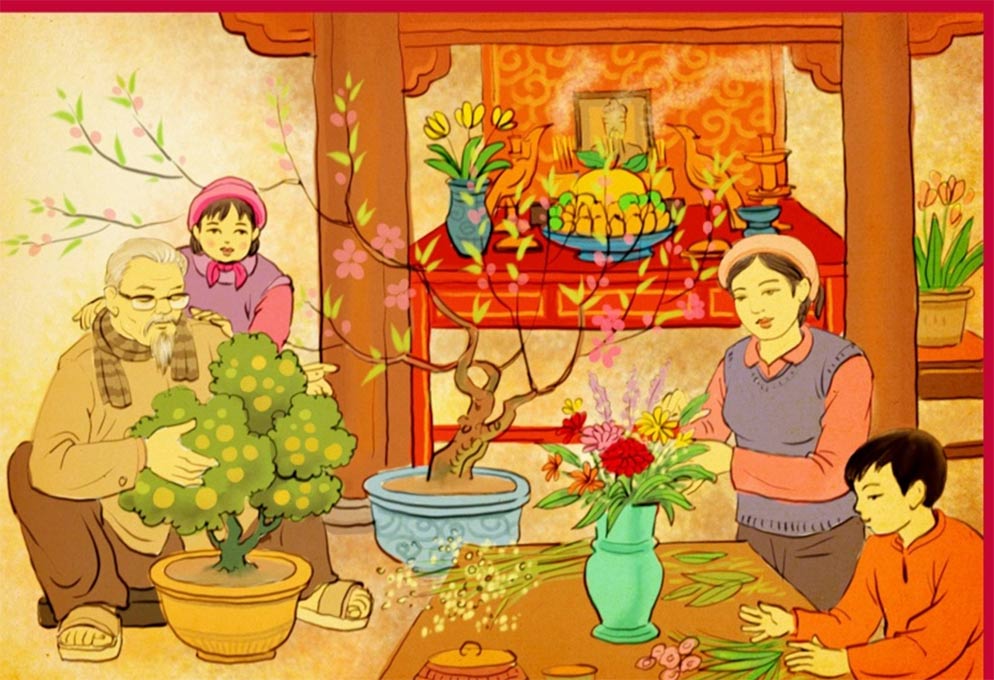The meaning of popular Lunar New Year traditions around the world
Each Lunar New Year custom has its own meaning . Let's learn about the legends and meanings behind popular Lunar New Year traditions today !

In many Western cultures, the New Year's season ends when the clock strikes midnight on New Year's Eve. But in other parts of the world—including China, Vietnam, the Korean Peninsula, the Philippines, Indonesia, Malaysia, and Singapore—the most popular holiday of the year is still weeks away. ' Lunar New Year celebrates the first days of spring according to the lunar calendar ,' says Jenny Leung, executive director of the Chinese Cultural Center in San Francisco. ' Traditionally, celebrating Lunar New Year in China means praying for good fortune in the new year's farming—so ancestor worship has always been an important component .' And that good luck is at the root of many popular and long-standing Lunar New Year traditions.
Clean the house to prepare for the new year
Every year is considered a fresh, new beginning, so it's important to start the new year with a clean house. ' It's believed that the house should be cleaned before New Year's Eve, which is described by the saying: Goodbye to the old and welcome the new ,' says Sijia Yao, PhD, associate professor of Chinese language and culture at Soka University of America in Aliso Viejo, California.
Cleaning your home before the New Year also means getting rid of all negative things, such as dirt and clutter. Before the New Year, you should clean as much as possible to clear away any bad luck and bad feelings from the previous year. If you don't clean your home before the Lunar New Year, it is believed that it can bring bad luck or block new opportunities from coming your way.
However, if you missed out on cleaning your home, don't try to make up for it by cleaning on New Year's Day. On that day, you are not allowed to clean anything. This is because people believe that luck will quickly accumulate at the beginning of the new year, thanks to the festive and harmonious environment, along with the rituals and customs that are intended to attract good luck and prosperity. For this reason, people do not sweep, wash, or throw out trash on the first two days of the new year because they do not want to throw away the luck and blessings that have been accumulated.
Decorate for good luck
Decorating your home for Lunar New Year focuses on the idea of bringing good luck to the family. Red and gold are the colors often chosen. Red symbolizes new life and prosperity; meanwhile, gold is associated with happiness, wealth and power.
Many people also decorate their walls with woodcuts depicting traditional New Year images. The content of these New Year paintings ranges from a mother holding a healthy baby boy, a symbol of good luck, to gods and idealized scenes of family life. You can also see red paper cutouts pasted on the windows of Chinese homes to bring good wishes; two fish swimming among lotus flowers symbolize prosperity, while a magpie in a tree symbolizes happiness.
Finally, there are lucky spring couplets that convey blessings and wishes for prosperity, happiness and good fortune. Spring couplets are carefully selected to match the family's sentiments for the coming year, and they are written in calligraphy on red paper, then, prominently displayed on entrances or hung on gates to invite good fortune into the home.

Visit relatives
Similar to Thanksgiving and Christmas, Lunar New Year is a holiday for people to gather with family members to welcome spring and the new year. More specifically, Lunar New Year traditions include visiting family and friends starting on the morning of the first day of the new year, around 8:00 a.m. or 9:00 a.m. This custom symbolizes bringing good luck to relatives and friends as early as possible in the new year.
When living family members gather together for the Lunar New Year, they make offerings to their ancestors to pay respect and remember those from previous generations. 'Common offerings include incense, food (such as fruit, meat, rice and sweets) and paper money burned as a symbolic offering. The offerings are placed on the family altar or at the family grave, accompanied by prayers and sometimes rituals.
In Vietnam, Tet Nguyen Dan is a week-long holiday. People from all over the country flock to their families. This occasion is often referred to as the 'largest human migration'.
Eat lucky food
Like most other holidays, Lunar New Year has special foods that are symbolic of each country. For example, people in Northern China eat dumplings and hide a coin in some of the dumplings. Whoever eats the dumpling will have a very lucky year. In Vietnam, Tet cannot be without banh chung and jam, which symbolize abundance and fullness.
Lucky money
This is perhaps a favorite custom and tradition of many young people. Every New Year, adults give children red envelopes containing money. Red envelopes in Chinese are called yasuiqian, a term derived from its homophone, meaning 'money to ward off evil spirits'. The amount of money varies depending on financial status, the closeness of the relationship, and regional customs.

Although the amount can vary, there are some basic rules to follow. Traditionally, the amount of money in a red envelope should be an even number, as even numbers are considered lucky in Chinese culture. However, the number four is avoided because it sounds like 'death'. In Vietnam, it is simpler, red envelopes are lucky money, so any amount is fine.
You should read it
- ★ The most bizarre Christmas customs in the world that many people do not know
- ★ The custom of welcoming unique New Year in the world
- ★ 15 traditional customs during the traditional Vietnamese New Year
- ★ 13 traditional customs during the traditional Vietnamese New Year
- ★ Thanh Minh and Vietnamese customs